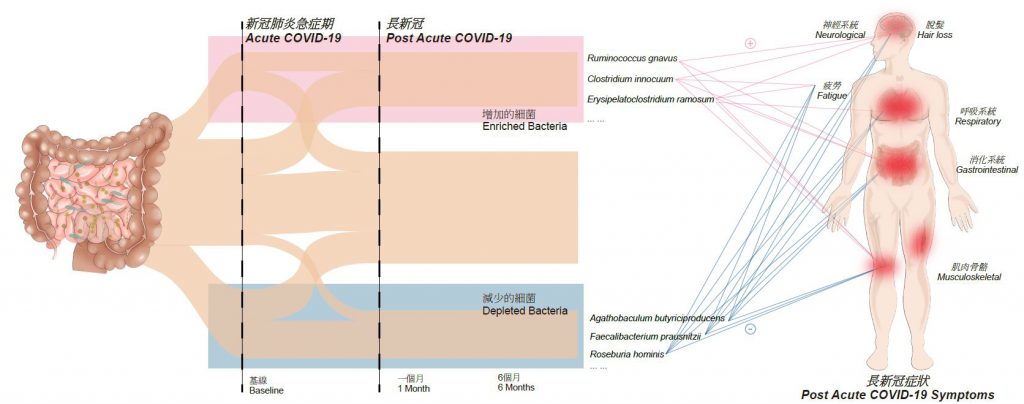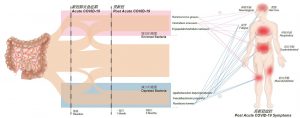CUHK
News Centre
CU Medicine study shows distinct gut microbial profile associated with long COVID
Post-acute COVID-19 syndrome, more commonly known as “long COVID”, is characterised by complications and/or persistent symptoms weeks and months after COVID-19 infection. A new study conducted by The Chinese University of Hong Kong’s (CUHK) Faculty of Medicine (CU Medicine) showed that the gut microbiome composition may be linked to a person’s risk of developing long COVID many months after their initial infection with COVID-19. The results have been recently published in the international journal Gut.
Over 75% of COVID-19 patients develop long COVID
In this study, long COVID is defined as the presence of at least one persistent symptom for four weeks after clearance of the SARS-CoV-2 virus. Some 76% of patients had at least one symptom six months after recovery from COVID-19 infection. Among them, fatigue (31%), poor memory (28%), hair loss (21%), anxiety (21%) and difficulty in sleeping (21%) were the most commonly reported symptoms. There were no significant differences in age, gender, co-morbidities, use of antibiotics or anti-viral drugs and severity of COVID-19 in patients with or without long COVID at six months.
Patients with long COVID have distinct gut microbiome dysbiosis
Patients with long COVID had a less diverse gut microbiome, while the gut microbiome of patients who did not develop long COVID was similar to that of those who did not have COVID-19. Patients with long COVID had significantly fewer “favourable” bacteria and a greater abundance of “unfavourable” bacteria than people who did not have COVID-19.
CU Medicine researchers looked at the composition of the gut microbiome to see if it was associated with different categories of long COVID symptoms, including respiratory, neuropsychiatric, gastrointestinal, skin (hair loss), musculoskeletal and fatigue. Eighty-one bacterial species were associated with different categories of long COVID and many species were associated with more than two categories of persistent symptoms. For example, persistent respiratory symptoms were strongly associated with opportunistic pathogenic microbes, while several species known to boost a person’s immunity were depleted in those with long COVID, including bifidobacterium adolescentis, bifidobacterium longum and bifidobacterium pseudocatelunatum. A patient’s gut microbiome configuration at admission may affect his/her susceptibility to long-term complications of COVID-19.
Professor Siew Chien NG, Associate Director of the Centre for Gut Microbiota Research at CU Medicine, remarked, “This is the first study to demonstrate persistent gut dysbiosis at six months after recovery from COVID-19 and the link between altered gut microbiota and common lingering symptoms. Our findings of bacteria taxa and their association with specific post-acute symptoms highlight that different microbial patterns may contribute to the development of different long COVID symptoms and how the microbiome could potentially serve as a proxy for the prediction of the development of specific post-acute COVID-19 symptoms.”
Professor Francis KL CHAN, Dean of Medicine and Director of the Centre for Gut Microbiota Research at CU Medicine, concluded, “Our findings demonstrate that an individual’s gut microbiome profile may affect their susceptibility to long-term complications of COVID-19. Considering the millions of people infected during the ongoing pandemic, the findings are impetus for consideration of microbiota modulation to facilitate timely recovery and reduce the burden of post-acute COVID-19 syndrome.”
This study was funded by a seed fund for Gut Microbiome Research provided by CU Medicine, and InnoHK, an initiative of the HKSAR Government’s Innovation and Technology Commission.

The research team of CU Medicine found that gut microbiome composition may be linked to a person’s risk of developing “long COVID”, which is characterised by persistent symptoms such as poor memory, hair loss and fatigue after their initial infection with COVID-19. Over 75% of COVID-patients develop long COVID.
Featured in the photo is the research team led by (1st from left) Professor Francis CHAN, Dean of Medicine and Director of the Centre for Gut Microbiota Research, and (1st from right) Professor Siew NG, Associate Director of the Centre for Gut Microbiota Research, at CU Medicine.






